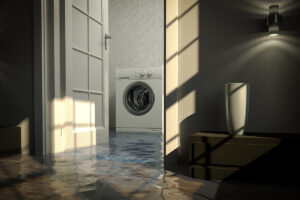
Sump pumps are unassuming but absolutely essential pieces of equipment for any home with a basement or crawlspace.
When it comes to our homes, there are certain components that often go unnoticed until they malfunction, causing chaos and costly repairs. One such unsung hero is the sump pump. Tucked away in basements or crawl spaces, sump pumps quietly work to prevent flooding disasters, yet they are often overlooked until it’s too late. So, let’s talk about what sump pumps are, why they’re crucial for homeowners, and common signs that indicate they may need maintenance or replacement.
What is a Sump Pump?
A sump pump is a small but mighty device installed in the lowest part of a basement or crawl space. Its primary function is to remove excess water that accumulates in a sump pit, a specially constructed hole designed to collect water from the surrounding area. When water levels reach a certain height, the sump pump activates, pumping the water out and away from the foundation of the home, usually through a discharge pipe that leads outside.
Why Are Sump Pumps Important?
Sump pumps play a crucial role in preventing flooding in the basement or crawlspace of a home, which can cause extensive damage to property and pose health risks due to mold and mildew growth. By efficiently removing excess water, sump pumps help to keep basements and crawl spaces dry, protecting valuable possessions, electrical systems, and the structural integrity of the home. Especially in areas prone to heavy rainfall or where homes are situated on low-lying ground, sump pumps are essential for maintaining a dry and safe living environment.
Signs Your Sump Pump Needs Maintenance or Replacement
Like any mechanical device, sump pumps require regular maintenance and occasional replacement to ensure they function properly when needed. Here are some common signs that indicate your sump pump may need attention:
- Strange Noises: If your sump pump is making unusual noises such as grinding, rattling, or whining, it could be a sign of mechanical issues or debris obstructing the pump’s operation.
- Frequent Cycling: Sump pumps should activate only when water levels in the sump pit reach a certain threshold. If you notice that your sump pump is cycling on and off frequently, it could indicate a malfunctioning float switch or other internal problem.
- Lack of Water Discharge: Check the discharge pipe outside your home to ensure that water is being pumped away from the foundation. If there’s no water flow or only a trickle, it could indicate a blockage in the pipe or a malfunction within the pump itself.
- Visible Rust or Corrosion: Rust or corrosion on the pump housing or components can weaken the pump’s performance and eventually lead to failure. Inspect your sump pump regularly for signs of rust or corrosion and address any issues promptly.
- Age: Like all appliances, sump pumps have a limited lifespan. If your sump pump is more than 10 years old, it may be nearing the end of its serviceable life and should be replaced preventatively to avoid unexpected failure.
- Foul Odors: If you detect foul odors coming from your sump pit, it could indicate stagnant water or bacterial growth, both of which can impair the pump’s effectiveness and indicate the need for maintenance.
Call Mahon Plumbing Today
If you still have more questions regarding your plumbing, we here at Mahon Plumbing are here to help. We have been serving the wider Baltimore area since 1994, so we have 25 years of experience to back up our fantastic service! Call us at our Baltimore location at 410-766-8566 or our Pasadena location at 410-636-7944. Be sure to keep up with us on social media by following us on Facebook or Twitter.
